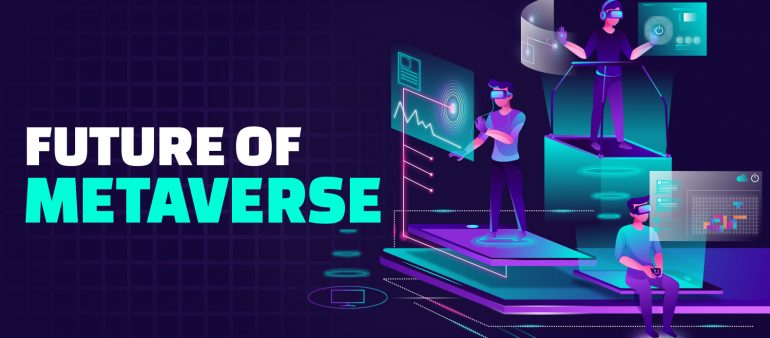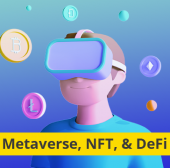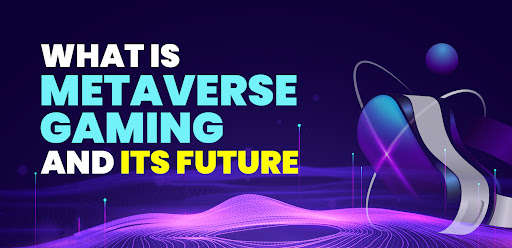The idea of the metaverse is straight out of a science fiction novel. The word “metaverse” is creating a buzz on the internet when Mark Zuckerberg announced that Facebook would be renamed ‘Meta’ in late October 2022. This sent a strong signal to the world that it would enter mainstream consciousness very soon. Several companies like Microsoft, Sony and Nvidia are investing extensively in this technology to gain benefits and transform how they work. Though it is difficult to foresee how the metaverse will evolve, it will likely significantly impact the future of work in almost all industries in the coming years. In this article, we take a peek at how the future of metaverse can transform the workplace.
What is metaverse?
Metaverse is an extension of the actual world made possible by emerging innovations. It is an online 3D virtual world where users interact with a computer-generated world and other users. A virtual space where users can meet, socialize, enjoy and work just like in the real world. Metaverse can be used to build virtual environments that reflect the actual world or can use them to create wholly new fictional worlds. This 3D world is made possible by a workable combination of virtual and augmented reality, social media and other virtual concepts.
Ways in which the future of metaverse can transform the work
Immersive learning experiences and training
The future of metaverse can transform training and skill development by considerably reducing the time required to develop and acquire new skills. AI-enabled digital coaches could offer career guidance and help train employees. It is especially beneficial for training in high-risk areas, where an immersive learning experience can simulate the real world while eliminating health and safety issues. Furthermore, the metaverse can help to improve employee performance and reduce training costs.
Remote work culture
Since the 2020 COVID-19 pandemic began, remote work culture has become a necessity. Even now, the vast majority of firms continue to run in a remote or hybrid workforce. But some issues are still prevalent and one main drawback is that they reduce communication and interaction among colleagues. The metaverse may restore communication without jeopardizing remote or hybrid work modules. According to studies, working remotely facilitates teamwork. However, the future of metaverse could undoubtedly improve VR workplace processes and environments to increase employee interaction and chat, strengthen collaborative tasks and others.
AI-enabled colleagues
The avatars of virtual colleagues will be the only constraint to the real-world counterparts. Many digital coworkers will join, including realistic, AI-powered, human-like bots. In the metaverse, these AI agents will play the role of advisors and helpers, undertaking much of the heavy lifting, thus freeing humans to focus on higher-value activities. In recent years, there has been immense progress in conversational AI systems that use algorithms to analyze text and voice conversations and speak in natural language. Such algorithms are now being used to create digital humans who can understand context, express emotions, make decisions and make human-like movements.
New roles in the metaverse economy
The internet did not simply bring new working ways; instead, it brought an entirely new digital economy - new jobs, new enterprises and new roles. So will the metaverse as the immersive 3D economy continues to gain momentum over the next decade.
Future major technologies that power the metaverse
Blockchain
Blockchain is a safe and reliable technology that offers a decentralized and transparent solution for digital accessibility, interoperability, collectability and value transfer. Users may transfer value using blockchain-generated cryptocurrencies while working in the 3D virtual world. This technology has the ability to encourage people to work in the metaverse. People will certainly gain more metaverse-related jobs with the growing popularity of remote working.
AR and VR
AR and VR are the access point for the metaverse. Both of these technologies are massive engines necessary to support the building of the metaverse project. It is one of the greatest tools for creating a virtual environment and interacting with it in the metaverse. AR can benefit users with physical simulations, and VR helps with 3D simulations. When putting these two together, they make an immersive and realistic metaverse experience in 3D settings. To put it simply, AR is helping to propel the growth of the VR industry.
Internet of Things (IoT)
IoT is a technology that links the real world with the internet through sensors and devices. When it comes to the metaverse, IoT strengthens the connection between virtual spaces and physical devices or objects. These devices can seamlessly share and acquire information to make the metaverse a more accurate representation of the real world. IoT provides the metaverse with real-time data gathered from the physical world. Such data can enhance the accuracy of the virtual world’s activities and make them relevant in the actual world.
Artificial Intelligence (AI)
Artificial Intelligence is another big name in the list of major technologies shaping the metaverse. AI is crucial in the development stages of the metaverse. Its ability to efficiently and accurately handle large amounts of data can be quite useful. In addition, it can be used to design non-player characters (NPC) that the players cannot control. NPCs respond to player activities automatically using predetermined algorithms. It can also be used to create 3D as well as realistic virtual avatars. AI can assist in the creation of more life-like avatars with facial expressions, haircuts, clothing and more.
3D Reconstruction
Creating natural and life-like environments is a crucial technology in the metaverse. It can form actual homes and structures in a three-dimensional space, allowing for realistic building creation in the metaverse. Users can interact with the digital replicas exhibited in the metaverse. Since the epidemic, 3D reconstruction technology has come into more use. 3D cameras as well as other technologies, provide authentic 3D images, attracting more users.
Edge computing
In modern businesses worldwide, edge computing is the technology that meets the need for faster data transmission. It is one of the main requirements in the metaverse that must be met. Users can access and benefit from the latest version of distributed computing for providing superior tech infrastructure and delivery features. This technology, which is used in commercial places, allows for a more seamless experience with less interruption. Furthermore, it provides its users with efficiency and an engaging gaming experience.
Top metaverse projects that exist today
Since the metaverse is the trendiest tech topic, every industry is diving into it, leading to an exponential rise in metaverse projects. Let’s take a look at some of the most popular projects that exist today.
Gaming metaverse - Decentraland:
Decentraland is a gaming-based decentralized metaverse project that aims to provide a realistic and engaging virtual environment for users worldwide to create, discover and trade NFTs. Users can buy land, play games, host live events, and do other fun activities that are also done in the actual world. The platform is powered by DAO ( decentralized autonomous organization) and is owned and regulated by its users. They can vote for decisions like feature upgrades and optimization, propose significant changes and engage in governance.
Multipurpose metaverse - Enjin:
Enjin is a metaverse project based on the Ethereum blockchain that allows for establishing of marketplaces on its horizon. Based on their industrial specialization, companies can develop decentralized NFT marketplaces, build NFTS, integrate them and exchange them for real money. The platform allows developers to establish marketplaces for gaming, branding, real estate and e-commerce. To prevent any unnecessary hassle, users can store and manage their NFTs on the secure Enjin platform.
Real estate metaverse - Upland:
Upland is a blockchain-powered gaming metaverse project that lets users purchase, sell and trade real-world properties. The properties on this portal are represented by NFTs, which users can own to become digital landowners and trade to generate UPX coins. Unlike previous metaverse projects, Upland aims to create a digital economy that merges the actual and digital worlds, allowing individuals to benefit from the utility of both worlds.
Conclusion
The metaverse is the internet’s next generation. Combining the elements of augmented reality (AR), virtual reality (VR), online games, cryptocurrencies and social media, the future of metaverse brings in a new era of interconnected virtual experience, reimagining the workplace. It will fundamentally alter the way we think about work. Work can take on any form we want to be, and this is due to the fact that the metaverse is a blank canvas that enables us to build any work environment we can think of.
Are you looking to venture into the metaverse business? Logic Simplified, the top game development company, can help you make your mark in the virtual future. We provide end-to-end metaverse development services for a wide range of business sectors. Our game designers and developers have a firm grasp of the metaverse and supporting technologies like NFTs, blockchain, cryptos, 3D technology, VR and AR tools and more to create futuristic projects. For any suggestions or queries, contact us or drop us an email at enquiry@logicsimplified.com.
 Get a Quote
Get a Quote








